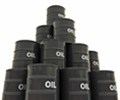In Oil & Companies News 08/06/2018

Global oil demand could peak in the early 2020s if countries pull together to hit climate goals, or keep growing until 2050 in a conflict-ridden world, according to Norwegian oil and gas firm Equinor.
Expectations for when oil demand will peak could change the supply dynamics, as investors weigh up whether to back long-term projects or to reduce their risks by focusing on investments with more rapid returns, such as shale oil, it said.
“An oil market in potential decline increases the uncertainty the producers face, reduces their investment horizon, and increases the focus on short payback periods for investments,” Equinor said in its new energy outlook.
Equinor, formerly known as Statoil, changed its name on May 15 to reflect its strategy of becoming a “broad energy” company. It plans to increase investments in renewable energy to 15-20 percent of its total capital expenditure by 2030.
Oil demand in 2050 varies between 59 million and 122 million barrels per day (bpd) in its three scenarios called Renewal, Reform and Rivalry, compared with 97.8 million bpd in 2017.
The Renewal scenario is consistent with the goal of the Paris climate agreement to limit a rise in the world’s average surface temperatures to below 2 degrees Celsius above pre-industrial times.
The Reform scenario, based on a continuation of existing policy and technology trends, sees oil demand peaking at 111 million bpd around 2030, and declining to 105 million bpd in 2050.
The geopolitical backdrop in Rivalry is “a fluid, volatile and conflict-ridden world”, where a lack of trust prevents countries from addressing climate change effectively.
“The value proposition of democracy declines, with many parts of the world now ruled by dictators and autocrats, some of whom are intent on exporting their authoritarian political models. Other issues than climate dominate the energy policy agendas,” Equinor said of this scenario.
The pace of transport electrification, energy efficiency, and “black swan” events – such as a commercial breakthrough in nuclear fusion technology, a potential source of safe and green energy – could also impact demand, Equinor added.
However, as the natural decline in existing production will likely be faster than the decline in oil demand, new investments will be need to close the gap.
Even under the Renewal scenario, some 480 billion barrels of oil will be needed by 2050 from new sources, more than the total supply from OPEC countries over the last 35 years, Equinor said.
Source: Reuters (Reporting by Nerijus Adomaitis; Editing by Mark Potter)

